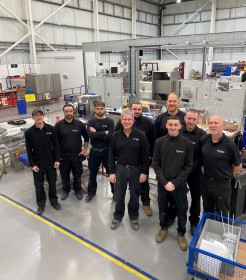Problem solving the food engineering skills gap
Published: 15 May, 2023
The skills shortages in engineering has been well documented. Led by the Institution of Engineering & Technology, a national campaign is now underway to try once again to address the shortfall of new entrants and embed engineering into the curriculum.
Fortress Technology, a Banbury-based food safety manufacturing firm, reports its programme of attracting a robust pipeline of engineers to fill the ageing workforce gaps - comprising apprenticeships, exciting pathways, excellent internal promotion prospects and a good work/life balance - seems to be working.
With nearly a fifth of UK engineers due to retire by 2026 and with the public image of manufacturing still tainted by a long-held belief that it’s dull, dangerous and dirty, Fortress caught up with a cross section of its engineers at various career stages to break some of these misconceived job taboos as they reveal their professional highs and lows.
For manufacturing, the promise of another golden era, led by projects to drive forward machine interconnectivity, automation, virtual troubleshooting and real-time data-led decision making should be temptation enough for young, eager minds. Yet, generally the industry reports that the rate of innovation is still outpacing supply.
It takes time to change long-held narratives, claims Fortress MD Phil Brown. Starting out as an apprentice himself, he believes that internal culture and community involvement can massively change distorted public perceptions about engineering.
Manufacturing may frequently be pigeon holed as less attractive than automotive or aerospace, yet as the world’s ninth largest manufacturing nation by output, the UK is still regarded as a heavyweight.
Apprenticeship Mentor and Operational Technical Support Manager Tony Tubb cites job security as the predominant advantage of pursuing career pathways within the sector. He expands: “Many of the skills gained in food engineering are highly transferrable. As a sector, it’s an exciting time with automation enabling companies to run more lines. This in turn opens up more career prospects in roles like testing, monitoring, quality assurance and even preventative maintenance.
“Compared to pharma, which is very methodical and regimental, food manufacturing offers the chance to view processes from different perspectives and find solutions based upon what a customer is looking for. There can be a lot of trial and error. But this adds to the fun.”
Technical Engineer Dan Shail took a less conventional route into engineering after training first as an architect and then working for a stint in retail. “I took myself back to night school before joining Fortress/Sparc 5-6 years ago. I tend to specialise in X-Ray and Checkweighing. It is a very hand-on job, there’s no day to day routine and I feel challenged daily. I can be supporting customers remotely, building machines or developing software. The job variety and developing machine features specified by customers are the things that really make me tick.”
A skills mismatch is also reported as one of the predominant factors for people not applying for engineering posts. More than three in five people report feeling underqualified, holding them back from pursuing a STEM career suggests a February 2023 report released by IBM. But from an employer’s perspective, academic qualifications aren’t the deal breaker states Brown. “We are looking for eagerness to learn, a bit of tenacity, people that fit with our culture, and team players that enjoy solving problems.”
Fourth-year Engineering Apprentice Mustafa Rashid recalls that initially he didn’t possess the academic requirements stipulated by MGTS. “In sixth form I completed an engineering qualification, which I enjoyed a lot. During these studies I also did work experience at the BMW mini plant. This experience combined with a recommendation from my engineering teacher led to an interview. That went well, prompting MGTS to reach out to Fortress who were seeking new apprentices. Fortress interviewed me, offered me a place on their programme. I have now just started a Level 4 HNC qualification.”
Meaningful rewards, defined career opportunities and being part of a project team and having your contributions acknowledged are also key drivers for the engineers of tomorrow, claims the Fortress’ MD. “Fortress people value being part of a team, solving challenges, with many saying that being part of an SME has actually fast-tracked their career.”
Reflecting on the aspects of his training, apprentice Sanjay says projects that have involved assembling machines are what he enjoys most, as it helps with the design process. “It’s great to see a design come to life with belts, stop alarms, sensors and reject bins. My ultimate career ambition is to become a production or mechanical engineer. The two roles seem to go hand in hand.”
For Technical Support Engineer Owen Jonathan, after 20 years on the road as a mobile service engineer, putting down roots and having a more stable work/life balance in a family-style organisation really appealed. “I came to Fortress with a lot of electrical, IT and mechanical knowledge. Fortress stood out for me personally because of the work variety, and also the potential for career progression.
“We tend to work closely as colleagues, resolving issues together rather than in isolation. It also feels really good being recognised for the effort we put in,” adds Jonathan.
Having been with the company pretty much from the start, Apprentice Mentor Tony Tubb has enjoyed many career highlights. Setting up a new manufacturing facility in the company’s new HQ last year was a particularly proud moment. “It was quite a mammoth task overseeing the transformation from an empty shell to a full manufacturing facility and merge two companies simultaneously,” Tubb reflects
Like Tubb, Benjamin Fisher finds the practical aspects of his work rewarding and remains a huge advocate of learning skills in the workplace. Ben adds: “It’s good to have a variety of pathways into work. For some that will be higher education, for others work-based training. Both are as respected. The important thing is to find what you are passionate about.”
Now overseeing the entire production at Fortress, Fisher fully believes that doing an apprenticeship in engineering expediated his career. He explains: “Within 10 years I climbed the ranks, from design to project management, operations manager to production manager at Fortress. Engineering can offer some great career pathways, along with excellent life skills.”
https://www.linkedin.com/company/fortress-technology-inc./

Banbury-based Fortress Technology supports the national IET campaign to address the shortfall of new entrants into engineering positions






